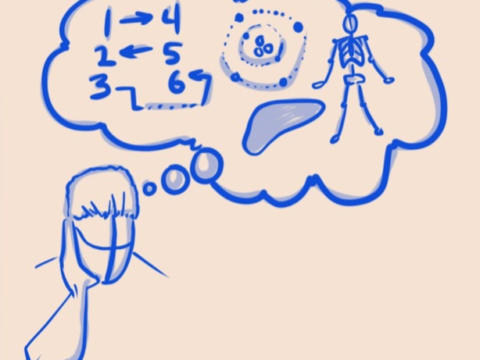With some introductions and some intuition about scale figured out, we need to take a quick fly by of body as a unit. This’ll help dodge another bullet that often kills your ambition to understand: getting lost in the “trees” without a sense of the “forest”. Nothing crumbles curiosity like fear, doubt and a sense that something is beyond your grasp. Basics are grounding and gives you a foundation to build details on. (At least Elon thinks it’s a good idea).
There are many ways to think about organizing the thing we call your body, you consist of:
- 37 trillion cells
- about 200 different types
- 4 types of tissues
- Skin, Muscle, Nervous, Connective
- 207 bones
- 80 organs
- and more
But generally, the best way to organize is the 11 different systems that work together to make you alive.
SIDENOTE: A system is just a bunch of stuff that works together to get a job done for you. A good example is your house likely has a working plumbing and a set of parts that takes clean water in and dirty water out, in other words: a system.
Because there is a whole lot of work being done here, you can think of your body as departments in Corporation You. Each department is getting a specific job done but they are often working together, like the sales department whose job it is to sell, but they still need to check in with HR to get their paychecks, these body departments overlap everywhere, here they are and what they can be compared to:
Nervous (Top Management)
This is decision territory, all sorts of info gets sent here & all sorts of commands get sent out from here. If this department is messed up, you are in a world of hurt, in fact, pain is a major part of the nervous system/department. Note that they have a lot of decisions on autopilot (the body is kind of a hand-me-down franchise with a lot of the operations figured out; they just need to be executed.).
Endocrine (Technical Management)
Some stuff can’t be communicated by top management (who specializes in nerve communication) so this department gets the nod. Nerves send here, but then chemicals deliver the rest of the way to the various destinations. This tends to be for slower moving commands like regulating body temperature vs speedier ones like a reflex to seeing a bee on your arm.
Gastrointestinal (Shipping & Receiving)
Your body constantly need new parts and more energy to keep surviving. This group takes in big parts and breaks them down so they are useable. It trashes what it can’t use. This department and the respiratory system really help keep everyone one else working!
Respiratory (Cafeteria)
Your body needs to take in, transform & get rid of air in order to keep all the other departments working. Working is the right word since there is a lot of energy required to keep everybody moving.
Cardiovascular (Delivery)
This is like the Amazon delivery network (or if you are older: the postal service) of the body. It picks up and drops off stuff for the rest of the body to use.
Immune & lymphatic system (Defense)
These folks are the department of defense in your body, their job it is to keep invading & dangerous germs out and if they come in: dead.
Urinary (Garbage)
This group helps process and get rid of internal waste created by the body. (The Gastrointestinal dept takes care of the external waste after processing what you eat.)
Skeletal (Building)
Lay off this department and you’ll need to figure out some Jabba-like ways to exist, this is the hard structured scaffolding that the Company You relies on to work within.
Muscular (Main Operations)
Of all the stuff that your brain & nervous system boss around, these fellas take the brunt of the non-automatic commands you execute in your day to day life. Wash the dishes, mow the lawn, lift those weights, on it!
Integumentary (Public Relations)
Dynamic department here, they protect the rest of the body from all sorts of stuff that wants to get in (partnering with immune department a lot), they communicate to top management in nervous system about dangers & safety levels outside Corporation You.
Reproductive (Franchising)
Creates more corporations. Everyone else tolerates this department, except top management who is periodically obsessed with them. Unlike all other departments, we don’t really need them to survive, but that could be argued. However; the entire future of the human body industry at large depends on this department.
Overall:
With an overview of scale, chemistry, & body systems you are well on your way to becoming an expert…in the basics. But things are just getting started…
–


